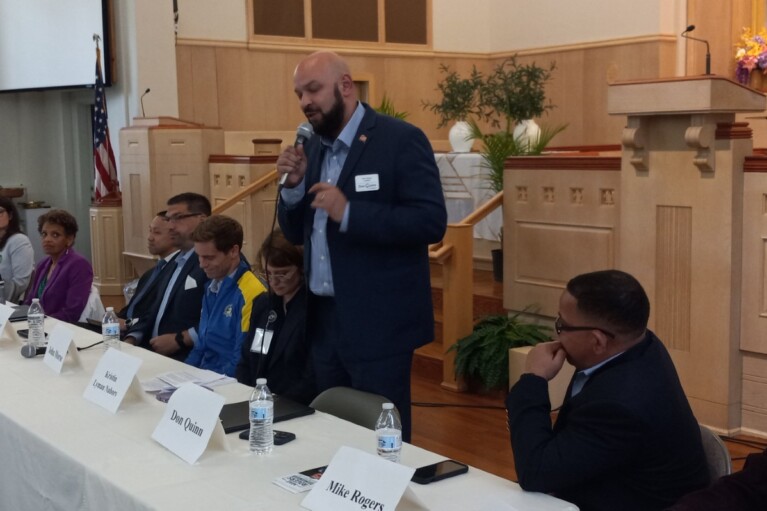Baltimore County Officials Announce Plan For Tiered Public Campaign Financing System
Baltimore County’s public campaign finance system, which is slated to roll out for the 2026 general election, could feature a tiered funding system to prioritize smaller donations under legislation announced by county officials Monday.
Baltimore County voters approved a charter amendment last November to create a Citizens’ Election Fund system in the county that would establish a public trust to match small donations for county council and county executive candidates. On Monday, Baltimore County Executive John A. Olszewski Jr. (D) and County Council President Julian Jones (D) announced legislation to set up the Fair Election Fund in the county.
Under the bill announced by Jones on Monday, candidates would have to file a notice of intent to participate in the public financing system, set up a new campaign account and meet the following conditions to participate in the planned program:
- Only accept donations from individuals;
- Only accept donations of $250 or less;
- Refuse donations from political action committees, corporations, political parties and other candidates; and
- Candidates would also have to prove their campaign is viable by meeting a minimum threshold of $40,000 in qualifying contributions from at least 500 local donors for county executive candidates and $10,000 in qualifying contributions from at least 125 local donors for county council candidates.
Matching funds would be distributed in a tiered system to prioritize smaller donations: Olszewski said candidates for county executive would receive $6 for each dollar of the first $50 in a donation, $4 for each dollar of the second $50 in a donation and $2 for each dollar of the third $50 in a donation. Matching funds would phase out after $150. For a maximum donation of $250, for example, a county executive candidate would receive $600 in matching funds.
Candidates for county council would receive $4 for each dollar of the first $50 of a donation, $3 for each dollar of the second $50 and $2 for each dollar of the third $50. Matching funds would also phase out after $150 for county council candidates who participate in the program. That means a county council candidate would receive $450 in matching funds for a maximum individual donation of $250.
Public matching funds are capped at $750,000 for county executive candidates in a campaign cycle and $80,000 for county council candidates, Olszewski said.
The legislation is based on recommendations from the county’s Fair Election Fund Work Group, which was chaired by Jones and included voting rights advocates, elected officials and community members.
The tiered system is similar to a bill passed by the General Assembly earlier this year to expand Maryland’s state-level Fair Campaign Finance Fund for governor candidates.
Creating a public financing system in Baltimore County was one of Olszewski’s promises during his 2018 campaign. His proposal received bipartisan support from the Baltimore County Council, which cleared the way for the charter amendment to appear on the 2020 ballot.
In addition to Maryland’s statewide public financing system, various local jurisdictions have similar programs. Montgomery County was the first to set up a program in 2014, and Baltimore City, Howard County and Prince George’s County have all since enacted their own programs.
“Simply put, money should not be a barrier to running for office,” Olszewski said.
U.S. Rep. John P. Sarbanes (D-Md.) said at the Monday press conference that the bill will help empower “ordinary citizens” to run for office.
“There’s a sense out there across the country, a kind of cynicism sometimes, that when it comes to empowering campaigns, funding campaigns, the insiders kind of have the advantage and that if you don’t have access to a lot of money or resources, you can’t really be a viable candidate,” Sarbanes said. “But we’re seeing through the best practices that this bill is modeled after … that you can push back against that. You can show that everyday Americans are the ones that have the power in our democracy.”
Emily Scarr, the director of Maryland PIRG, said public campaign financing systems both cut back on barriers to running for office and help limit corporate and special interests’ influence over elections.
Morgan Drayton, policy and engagement manager for Common Cause Maryland, said the fund will “make it possible for more women, Black people, other people of color and young people to run competitive races” in Baltimore County.
Baltimore County Council member David Marks (R), a member of the Fair Election Fund Work Group, noted that Gov. Lawrence J. Hogan Jr. (R) used the state’s public campaign financing system during his 2014 gubernatorial campaign. Marks said public campaign financing gives “smaller parties and underfunded candidates a better opportunity to get their message across.”
Jones said the system will not only enable more candidates to appear on the ballot, but to reach voters in their campaigns.
“Unfortunately, if you don’t have the funds, you can’t get your message out,” Jones said. “So these folks will be on the ballot … but oftentimes the citizens wouldn’t know what their positions are, where they stand. This fund will provide the resources so that the citizens will be able to add or adequately hear the positions of the candidates and then make the proper decision, which will enable us to have the best elected officials we can here in Baltimore County.”




 Creative Commons Attribution
Creative Commons Attribution